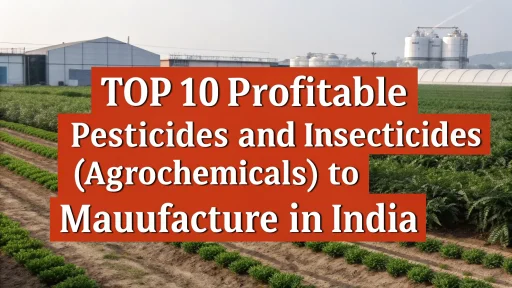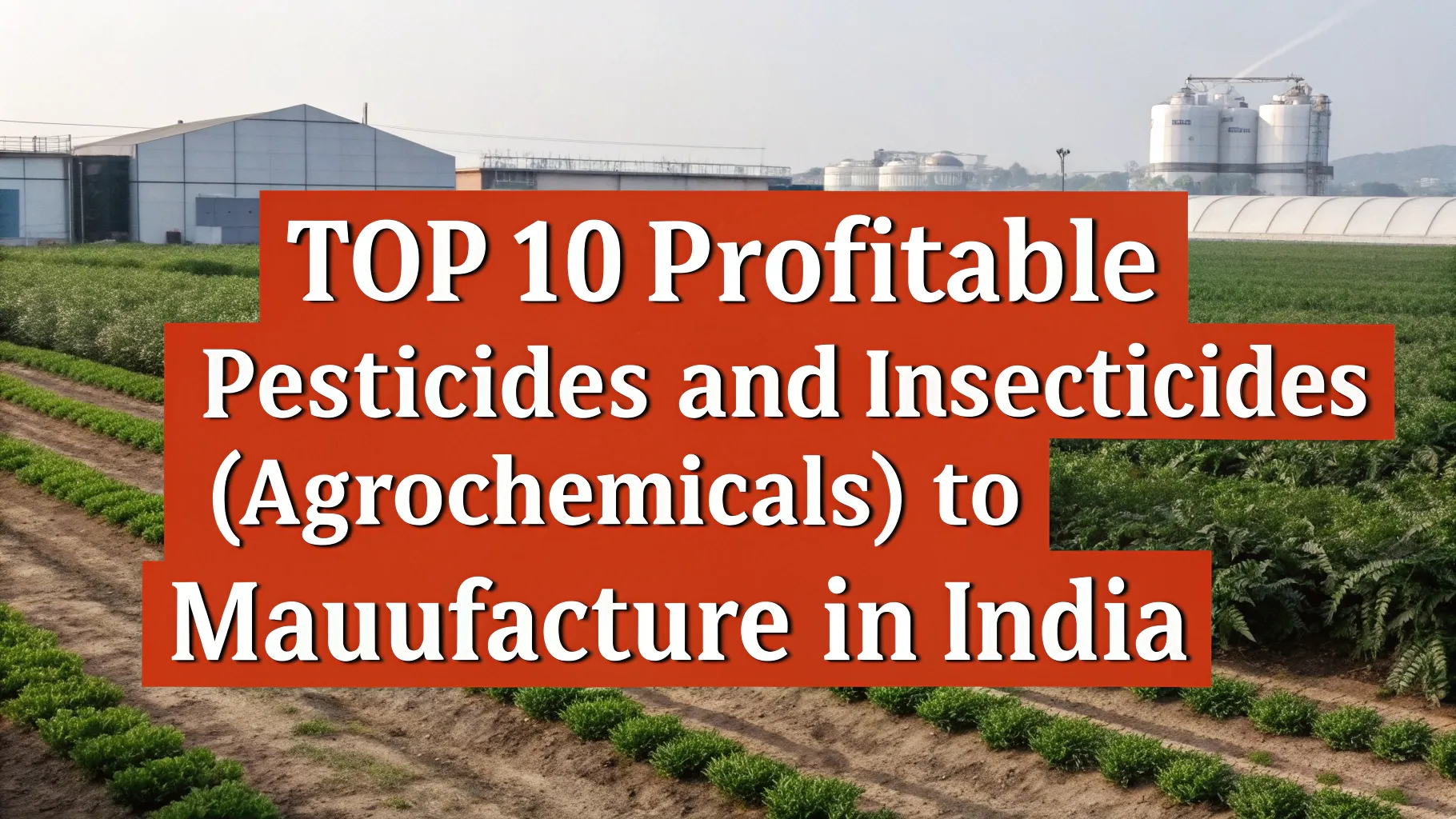In India’s rapidly changing agriculture, the pesticides and insecticides manufacturing sector plays an integral part in ensuring the protection of crops as well as maximizing yields and aiding in food security. As the population of the world is growing and arable land shrinks, the demand for high-efficiency crop protection is increasing. This demand isn’t just driving innovation, but it is creating profitable opportunities to Indian entrepreneurs and producers.
India is the fourth-largest producer of agrochemicals around the world. Its exports are increasing quickly, driven by growing demand in Latin America, Southeast Asia, and Africa. If you are a new player looking to venture into this market, it is crucial to comprehend the changing demands and demand dynamics, as well as the chemical properties of as well as regulatory hurdles. Of the many chemical variations, only a few insecticides and pesticides are proving to be highly profitable because of their broad use, constant demand, and export potential.
This article focuses on ten of the most lucrative pesticides and insecticides that have substantial potential for companies in India’s agrochemical industry.
1. Chlorpyrifos
Chlorpyrifos, an organophosphate insecticide widely employed to combat pests in sugarcane, cotton, paddy and pulses. Despite the pressure of global regulations, the chemical continues to dominate vast portions in the Indian market because of its efficiency and effectiveness, as well as its broad-spectrum action.
Chlorpyrifos disrupts the nervous system of insects, which makes it extremely effective against all kinds of insects, including caterpillars, aphids, and stem borers. The process of making it involves chlorination and then reaction with diethylphosphorochloridate. The process is fairly complex and requires a well-designed layout and safety procedures. The demand for chlorpyrifos is still high in the agricultural belts of rural areas, and export towards countries within Africa and Asia continues to bring constant revenue for Indian producers.
2. Imidacloprid
An insecticide with a neonicotinoid, Imidacloprid is extremely effective against sucking insects, such as Jassids, aphids and whiteflies. This makes it a top choice for the horticulture and cotton growers. It is well-known for its systemic action which permits it to grow throughout the entire plant, and provides long-term protection.
Imidacloprid’s chemical stability as well as its low dosage for application, give it the advantage of lower cost. Market demand for Imidacloprid is growing due to the increased demand from commercial farms as well as household applications for pest control. As resistance to old pesticides, many farmers are moving to newer-generation molecules such as this one.
Related: How to Start an Agrochemicals Manufacturing Business?
3. Lambda-Cyhalothrin
Lambda Cyhalothrin, a synthetic pyrethroid renowned for its fast-acting knockdown effects that are fast-acting. Its popularity stems from its low toxicity to humans as well as its potency in small doses.
The production of this compound requires the process of esterification and cyclopropanation which requires sophisticated process control and purification methods. The rising demand for the compound is related to its use as part of public health programmes that aid in mosquito control. Buyers in both the export and domestic segments widely accept it, especially in Latin America and sub-Saharan Africa, where malaria control programs purchase it in large quantities.
4. Carbendazim
Although technically a fungicide, manufacturers often combine Carbendazim with insecticides to create integrated pest control formulations. Research has proven its effectiveness against a wide spectrum of fungal diseases, such as leaf spots and blights, affecting cereals, fruits, and vegetables.
The process of synthesis for Carbendazim involves the methylation of benzimidazole intermediates. This process is manageable in mid-scale production facilities. The ability to use it in combination or as a part of an entire mixture allows it to be a versatile and lucrative product for producers. Concerns about fungal infections are rising in regions with high humidity The demand in Carbendazim-based products continues to increase in both the local and international markets.
5. Acephate
Farmers and growers extensively use Acephate for its broad-spectrum action and low residue levels. They apply it in the cultivation of cotton, vegetables, and ornamental plants to combat pests like leaf miners, aphids, and caterpillars.
Manufacturers find the process for making Acephate fairly simple compared to other organophosphates. It involves methamidophos acetylation under controlled pressure. Consumers in both urban and rural markets find it reliable, economical, and highly satisfactory. Recent years have seen its application in garden kits and greenhouse operations has led to numerous retail sales opportunities for producers.
Related: Top Agrochemicals to Manufacture in India for Export Profits
6. Fipronil
Fipronil is a Pesticides and Insecticides with a broad spectrum of phenylpyrazole employed in agriculture as well as for pet treatment. It is extremely efficient against termites, ants, and beetles. It’s becoming increasingly utilized as a part of integrated pest management because of its unique mode of action that targets the central nervous system.
The Fipronil synthesis process requires specific fluorinated intermediates that require specialized and cautious handling because of its persistence in the environment. Yet, its economics remain impressive because of its use in the fields of agriculture and for consumer products for pest control, such as sprays and gels. Exports of Fipronil from India are steadily increasing, particularly to North America and Europe, where pet care products are popular.
7. Bifenthrin
Bifenthrin is a synthetic pyrethroid, similar to Lambda-Cyhalothrin, with enhanced soil stability, which makes it suitable for foliar as well as soil applications. It can control a broad range of insects, including armyworms, termites, and rootborers.
Manufacturing Bifenthrin requires a controlled reaction environment as well as advanced distillation equipment for purification. It is widely used in the corn, sugarcane, and soybean industries. Bifenthrin-based formulas are also used in turf management as well as the prevention of health-related vectors, increasing their market potential. Indian companies have discovered an excellent export market for Bifenthrin in Australia and in the Middle East.
8. Monocrotophos
Despite being banned in a number of countries because of concerns over toxicity, Monocrotophos still enjoys significant usage in India for the control of pests that affect crops like maize, cotton and pulses. It has high efficiency at the lowest cost, which makes it desirable for marginal and small farmers.
Its production involves relatively easy chemical processes, which result in its low production costs. However, strict handling by the regulatory authorities, labeling, distribution, and control must be adhered to. As the regulatory landscape changes and the market evolves, some Indian companies are looking into alternative products with low toxicity. However, for the time being, Monocrotophos is a commercially appropriate product in some regions in India in addition to Southeast Asia.
9. Pendimethalin
Although it is primarily a herbicide, Pendimethalin is frequently a part of the integrated pest and weed control programs. It is utilized to control weeds before their emergence in the fields of soybean, wheat and rice, which makes it an excellent addition to any product line of pesticides.
The process for production includes the chlorination and nitration steps, followed by purification as well as solvent extraction. Pendimethalin has a steady demand throughout the year because of its use in of the Kharif as well as Rabi seasons. A lot of Indian firms are now manufacturing it in granular form as well as liquid formulations with a broader application.
10. Spinosad
Spinosad is a naturally derived insecticide that is considered to be a “green” alternative in the market for pesticides. It is made by the fermentation of a certain soil bacterium, and is renowned for its ability to fight fruit flies, thrips, and caterpillars.
In light of the worldwide push to promote sustainable farming, the use of Spinosad-based formulations has been gaining popularity in organic agriculture, horticulture, as well as the production of fruit. The production process, while biologically complicated, is adaptable and profitable because of the premium price. It is also getting more popular on European as well as American markets with strict residue limits. stimulate the demand for natural alternatives.
For more information, check out this video
Final Thoughts
The production of pesticides and insecticides industry in India isn’t just huge but also brimming with lucrative growth opportunities. Each of the products listed above has specific challenges in terms of formulation, regulation and marketing, but all have demonstrated the viability and profitability for both export and domestic markets.
Companies that can make it through regulatory frameworks and set up strong quality control systems will stand to reap the benefits of the growth of this industry. With the growing awareness of the health of crops as well as pest resistance and sustainable agriculture, the demand for both conventional and modern-day pesticides is set to grow even more.
If you are a business owner, investing in profit-making Agrochemicals such as Imidacloprid, Fipronil, or Spinosad will ensure a solid market presence and lucrative profits, if operations are supported by sound R&D as well as safety-related compliance and a quality-focused manufacturing facility.
Which business to start? How to choose a business idea?
About NPCS (Niir Project Consultancy Services)
Niir Project Consultancy Services (NPCS) provides comprehensive Market Survey as well as Techno-Economic Feasibility reports that help entrepreneurs navigate each step of starting a new manufacturing company. These reports provide crucial details, including raw materials, Pesticides and Insecticides manufacturing process plant layout, as well as regulatory compliance. NPCS assists Indian entrepreneurs in assessing the economic and practical viability of the establishment of new manufacturing units.







